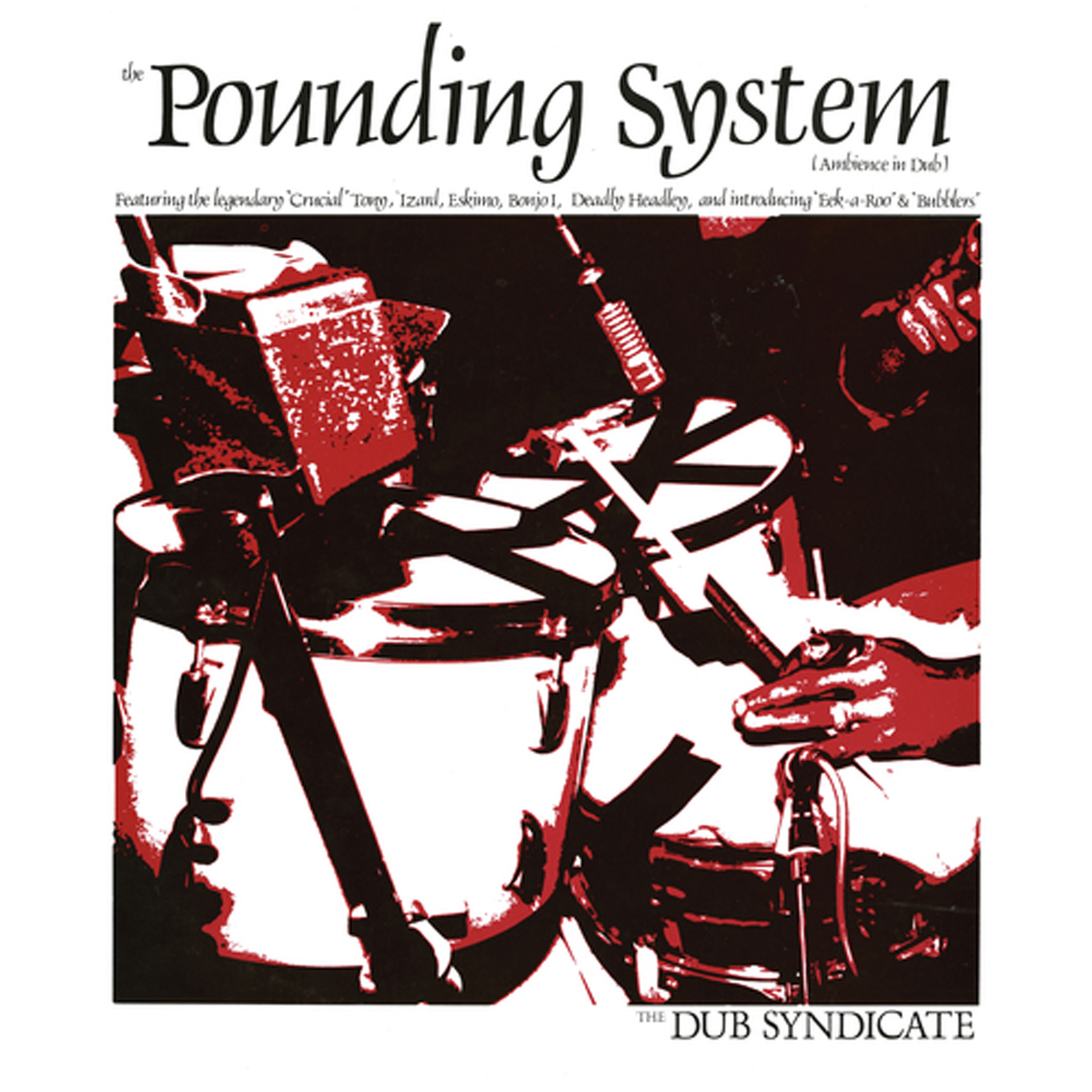Dub Syndicate, "The Pounding System"
 Newly reissued, this 1982 debut from Adrian Sherwood’s eclectic dub project is an ambitious and occasionally perplexing affair. The album’s subtitle, "Ambiance in Dub," goes a long way towards explaining the unusual and embryonic aesthetic, as does the fact that it was recorded by a revolving cast of guest musicians during a fortuitous window at a well-equipped studio: these are very simple and stripped-down bass-driven songs that leave plenty of room for each individual element to breathe. That is ideal for Sherwood’s experiments with reverb and mic placement, which seem to be The Pounding System's raison d’être: this is very much a playground for Sherwood’s production and recording wizardry. I suppose that could be said of all dub, but it feels like Sherwood is animating skeletons rather than deconstructing complete, fully formed songs. To my ears, Dub Syndicate's later, more layered work holds up much better than the semi-traditional dub reggae found here, but The Pounding System is a pleasant (if uneven) teaser for the more substantial work on the horizon.
Newly reissued, this 1982 debut from Adrian Sherwood’s eclectic dub project is an ambitious and occasionally perplexing affair. The album’s subtitle, "Ambiance in Dub," goes a long way towards explaining the unusual and embryonic aesthetic, as does the fact that it was recorded by a revolving cast of guest musicians during a fortuitous window at a well-equipped studio: these are very simple and stripped-down bass-driven songs that leave plenty of room for each individual element to breathe. That is ideal for Sherwood’s experiments with reverb and mic placement, which seem to be The Pounding System's raison d’être: this is very much a playground for Sherwood’s production and recording wizardry. I suppose that could be said of all dub, but it feels like Sherwood is animating skeletons rather than deconstructing complete, fully formed songs. To my ears, Dub Syndicate's later, more layered work holds up much better than the semi-traditional dub reggae found here, but The Pounding System is a pleasant (if uneven) teaser for the more substantial work on the horizon.
Sherwood’s ensemble for this early incarnation changes significantly from song to song and is a bit bewildering and incestuous, as almost everyone has some kind of alias and some degree of prior association with On-U sound.The core of the group is essentially Creation Rebel though (Sherwood did much of his early production work with them).Their guitarist, Crucial Tony, proves to be especially worthy of his name, as his bass lines form the bedrock of much of this album.In fact, roughly half of these pieces seem like Tony vamping on a bass riff along with either his Creation Rebel bandmate Eskimo or Divided Roots' Donald "Eek-a-Roo" Campbell.Even when Lizard Logan handles the bass duties, Crucial Tony is often still credited as a songwriter–he has his fingers in everything.Notably, Eskimo is a bit of a Dub Syndicate fixture as well, returning on some later records, but The Pounding System is the only album recorded before Style Scott claimed the stool and became a central protagonist in everything to follow.In any case, The Pounding System definitely suffers a bit from the hyper-limited "rhythm section only" palette, as "Humorless Journalist Works to Rules" is essentially just a one-riff bass and drum jam punctuated by some occasional wild production flourishes.Even several of the more fleshed-out songs are only embellished by a couple of major chords, which leaves me thirsty for literally anything else to turn up. Some vocals would have been especially welcome, but most of the excitement and variety comes from either African Head Charge's clattering percussion or a couple of saxophone cameos.In particular, Mr. Flesh's ghostly, reverb-swathed melody hook on "Pounding Systems" makes that piece a stand-out, but Jamaican session legend Deadly Headley makes "Don't Care About Space Invaders Machines" a highlight as well with his charmingly breezy melodies.
Unfortunately, the drums on this record are major sticking point for me, as booming rock drums are not ideal for maintaining dub's smoky, elegantly blurred spell.I doubt the drummers themselves were to blame though, as this was very much Sherwood’s show and I have heard Eskimo play more fluidly elsewhere.Regardless of who is behind the kit for The Pounding System, the drums almost exclusively stick to a plodding mid-paced boom-bap, which admittedly leaves a lot of space between kick drum and snare hits for dubby cymbal flourishes and clattering fills.It also leaves a lot of room for every single snap or thump to reverberate, which Sherwood seemed quite fond of during this period: big, thundering drums with a long decay.That certainly allows Sherwood plenty of room to work his magic, but it also results in a somewhat leaden feel that feels completely antithetical to the heady grooves of classic dub.That is the fundamental tragedy of this release: Sherwood is trying his damnedest to put on a dazzling showcase, yet the album is kind of stuck in neutral because there is not a hell of a lot happening melodically, harmonically, or rhythmically beyond the barest bones of reggae.There is just not a lot of character here, as many of these songs feel like hurriedly composed workmanlike facsimiles of quality reggae rather than the real thing.Whether that was due to the circumstance or whether Sherwood simply got much better at this later is hard to say.What is clear is that the best dub albums are almost always the ones where a great producer takes on great songs or a great band, not the ones where a producer has carte blanche to indulge his every whim from the ground up.
That said, there are still a couple of head-turning moments to be found on the album, most notably "Crucial Tony Tries to Rescue the Space Invaders," which boasts both the most fluid, absorbing bass groove on the album and an extremely cool crescendo of reverberating shudders and squelches.It is not radically different from some other pieces, but the execution is on an entirely different plane, as Sherwood keeps things at a perfect simmer and periodically lets the drums drop put altogether.It is definitely Sherwood’s zenith for deftly juggling dynamics while maintaining both a healthy bit of unpredictability and forward motion (for this record, at least).Curiously, Dub Syndicate seem to be at their best only when directly paying homage to Space Invaders (and/or needling Scientist), as "Don't Care About Space Invaders Machines" is the album’s most overly melodic and vibrantly percussive piece.Also, Sherwood himself contributes some nice space-y electronics.  As for the rest of the album, a lot of it sounds like some members of a professional reggae band idly testing some new ideas in a practice space while they wait for the rest of the band to show up (the good songs sound like what happens when they finally do).Perplexingly, a few of these pieces are actually cannibalized classics from the On-U Sound catalog (Bim Sherman’s "Across The Red Sea" and Prince Far I’s "Bedward the Flying Preacher"), but they go through a kind of reverse alchemy and emerge as less compellings shadows of their former selves.Too much was carved away, frankly, and Sherwood’s studio pyrotechnics could not do all of the heavy lifting on its own–his instincts had not quite caught up with his technique at this stage of the game.Or maybe they had, as Sherwood produced those better versions too–perhaps this project was initially a flight of pure indulgence that later grew into something more.Either way, there is a decent amount to like here, but The Pounding System is also evidence that Adrian Sherwood did not instantly spring into being as a fully formed cultural visionary.
 



